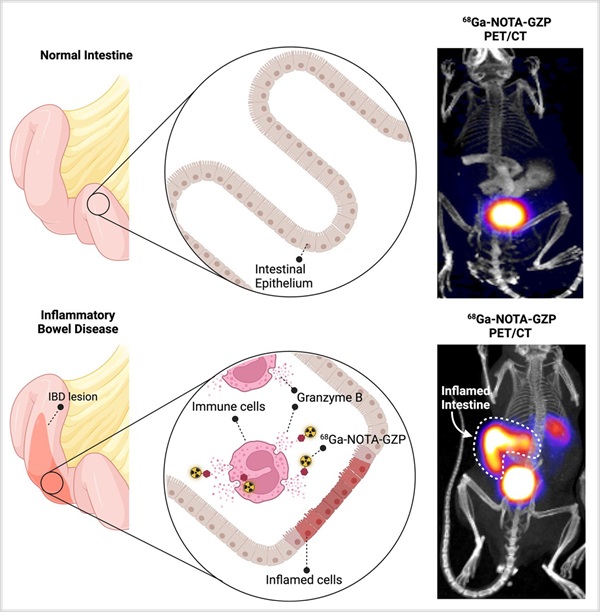New Imaging Method Non-Invasively Detects Inflammatory Bowel Disease
Posted on 29 Jul 2024
Inflammatory bowel disease (IBD) is a chronic gastrointestinal inflammatory condition that includes two primary groups: Crohn's disease and ulcerative colitis. Despite progress in managing IBD, there are ongoing challenges in improving diagnostic accuracy, resolving treatment intolerance, and managing the recurrent cycles of remission and relapse. Additionally, long-term IBD increases the risk of cancer, necessitating continual monitoring of disease activity. Currently, no methods can accurately detect and differentiate active inflammation from chronic disease. MRI and CT scans reveal structural changes in the bowel, and other imaging methods identify increases in immune cell numbers in tissues, but none of these techniques fully capture the dynamic immune responses in the colon. Now, a novel imaging technique, granzyme B PET, has been developed to non-invasively detect IBD and provide real-time imagery of active inflammation within tissues. According to research published in the July issue of The Journal of Nuclear Medicine, the insights from PET imaging could help monitor the effectiveness of IBD treatments and potentially lead to more tailored patient management strategies.
In this research, scientists at Massachusetts General Hospital (MGH, Boston, MA, USA) explored the potential of the granzyme B gene as a biomarker for IBD detection and treatment response prediction. Human tissue samples from Crohn’s disease and ulcerative colitis patients, both during active and inactive phases, as well as from non-inflamed bowel tissues, were stained to measure granzyme B expression. The findings showed that granzyme B levels were significantly higher in inflamed tissues compared to non-inflamed ones, with active disease tissues showing higher levels than those from inactive disease. Additionally, tissue samples from IBD patients who responded to treatments exhibited lower granzyme B expression compared to those from non-responders.

Further, the researchers assessed granzyme B expression changes in a murine model, including colitis-induced and control mice. These mice underwent 68Ga-NOTA-GZP PET imaging at one, three, and four weeks. The PET imaging revealed significantly higher bowel uptake of 68Ga-NOTA-GZP in the colitis-induced mice compared to control mice. Post-treatment, although 68Ga-NOTA-GZP uptake decreased in the colitis-induced mice, it remained significantly higher than in the controls throughout the study.
“A non-invasive imaging method to detect immune system activation with high resolution is key to improving IBD management,” said Pedram Heidari, MD, radiologist and service chief of nuclear medicine at Massachusetts General Hospital. “Granzyme B PET can help with the timely detection of the active disease, determination of the need to start treatment, and monitoring the response to treatment to ensure the resolution of the inflammation. This is particularly important for monitoring inflammation in the parts of the bowel that are not accessible for endoscopy and tissue sampling. This is a unique tool that can significantly change the trajectory of disease by closely monitoring treatment efficacy and is the true definition of precision medicine.”
Related Links:
MGH










 Guided Devices.jpg)



